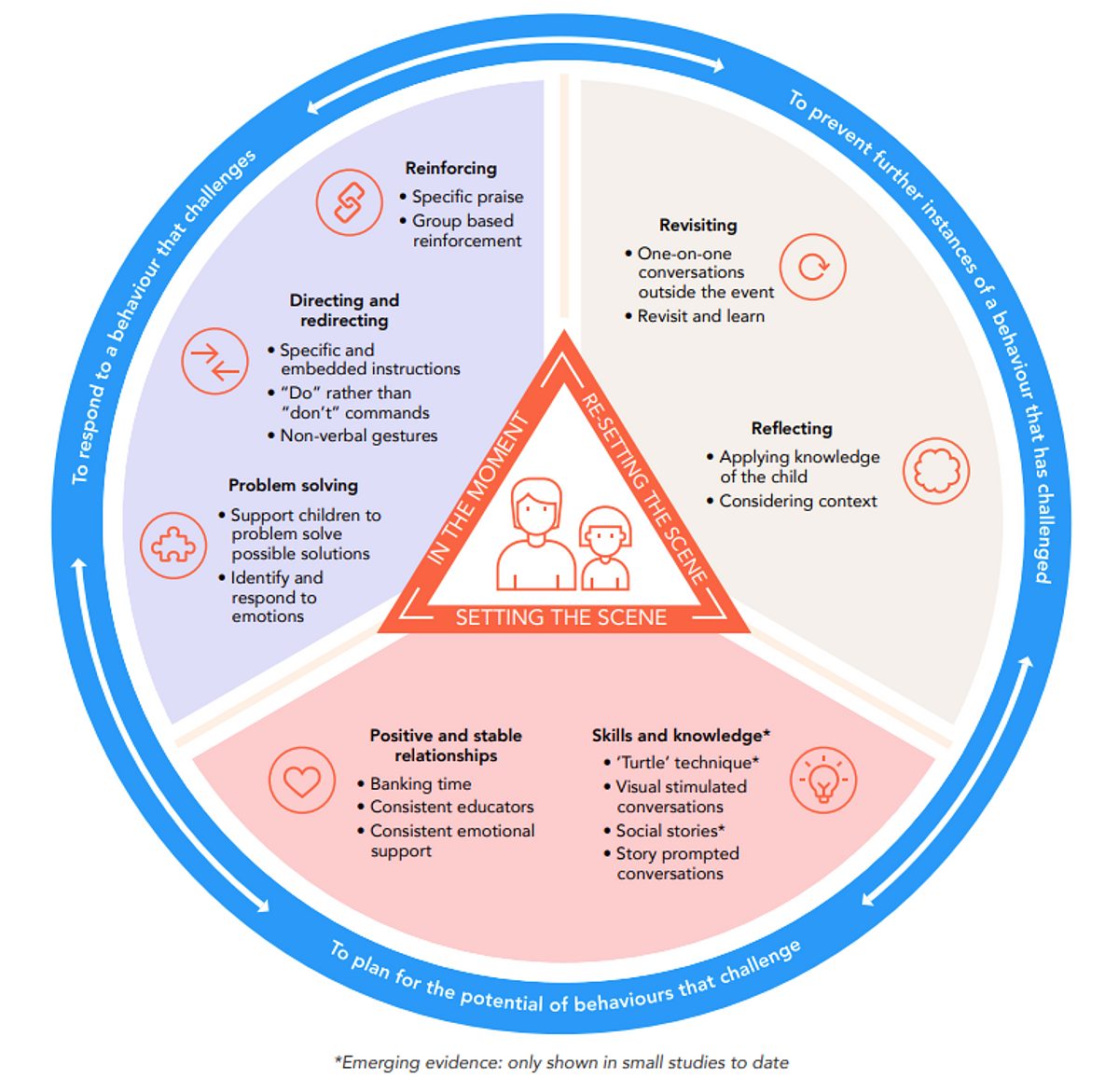Challenging behaviours have been identified by Australian educators as a major barrier to workplace wellbeing and a key area of practice they seek support for (Thorpe et al., 2023). Challenging behaviours can include disrupting, not following directions, negative interactions with peers and expressing intense emotions.
To support Australian educators to respond to challenging behaviours in ECEC settings with children aged 2 – 5 years old, we at Evidence for Learning (E4L) have developed a series of free, evidence-informed resources that are aligned with the NQS. These resources are based on the findings of a systematic literature review and offer practical guidance and easy to implement strategies at three stages:
- Setting the scene to prevent or plan for the potential of behaviours that challenge
- Responding in the moment to a challenging behaviour
- Re-setting the scene to prevent further instances.
These resources have been developed for educators to use in conjunction with other approaches and resources to support children’s self-regulation, learning and wellbeing.
What does the research evidence say about supporting behaviour in ECEC?
1. Setting the Scene
Setting the scene is an opportunity to communicate expectations and build positive relationships to encourage pro-social behaviour and help prevent challenging behaviour. Educators can try ‘banking time’ to develop relationships by spending 7 – 15 minutes a day engaged in one-on-one child-led play. They can also support children to develop their own capacity by using storybooks to discuss characters’ feelings and emotions or by using pictures or videos of the child showing a positive behaviour to prompt conversations about it.
2. Responding in the moment
Educators can use a range of strategies to respond when challenging behaviour occurs:
- Verbal statements can be used to direct (guiding children towards a behaviour) or re-direct (guiding children away from a behaviour). For example, instruct and specify the action needed, such as “Please put your hat on for outdoor play”.
- Non-verbal prompts can also be used to guide a child’s behaviour. For example, if a child interrupts a conversation, the educator may gently hold the child’s hand to indicate they are aware of the child but to wait a moment.
- Brainstorming possible solutions with the child and help them identify and respond to their emotions.
3. Re-setting the scene
Making time for conversations with children after a challenging situation can be an opportunity for educators to listen to the child’s perspective, give guidance on the impact of the behaviour, and discuss different strategies for future use.
Responsive practices consider individual differences and contextual factors that may contribute to behaviour. Educator knowledge of each child and the different strategies they can use will support responsive practices, and children’s overall behaviour and engagement.
The framework below summarises the evidence-informed strategies educators can use at each of the three stages.

Figure 1: Supporting behaviour framework
Putting evidence into practice
Si Ning Koh from Orchard Early Learning Centre shares insights on how some of these strategies are put into practice in her setting:
Other approaches to support behaviour at Orchard Early Learning Centre include:
- Using evidence-informed practices such as those outlined in the E4L tip sheets
- Working with allied health professionals and families to consistently use the same evidence-informed approaches such as visual routines and social stories
- Embedding social and emotional development into the curriculum, where children are supported to resolve conflicts and have opportunities to develop their communication, collaboration and resolution skills in play
- Identifying peer mentors who may assist children to co-regulate and to meet expectations throughout the day.
Reflections for educators
Setting the scene: Which child or children do you think would most benefit from ‘banking time’ by spending 7 – 15 minutes a day in one-on-one child-led play sessions? How could you plan this into your day?
Responding in the moment: Experiment with the verbal and non-verbal prompts you use. Do you use a particular approach more than others? Do you notice that some prompts are more effective? How might you incorporate a different verbal or non-verbal prompt?
Re-setting the scene: Reflect on a recent behaviour that challenged. Consider the following to help tailor a response to the child’s needs:
- Is the behaviour specific to a situation, time, activity and/or child?
- What are your goals or expectations? Are these realistic and achievable?
- What insights might colleagues, families or other professionals have?
- What strategies have you (or others) tried? What has been the response?
- Have you involved the child in problem solving?
- Do you need to seek additional support?
Further reading and references
ACECQA. (2023). Guide to the National Quality Framework. https://www.acecqa.gov.au/sites/default/files/2023 – 03/Guide-to-the-NQF-March-2023.pdf
Evidence for Learning. (2023). Responding to challenging behaviour in ECE. https://e4l.org.au/behaviour-ece
Staton, S., Coles, L., Houen, S. Seale, B., Mecklenburgh, N, Van Halen, O., Panthi, N., & Thorpe, K. (2019). Responding to challenging behaviour with Children aged 2 – 5 years in Early Childhood Education and Care settings. Available from: https://e4l.org.au/ECEbehaviourreview
Thorpe, K., Panthi, N., Houen, S., Horwood, M., & Staton, S. (2023). Support to stay and thrive: mapping challenges faced by Australia’s early years educators to the national workforce strategy 2022 – 2031. The Australian Educational Researcher, 1 – 25.
